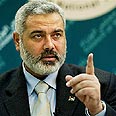
Haniyeh's complaints unwarranted
צילום: איי פי
Palestinians confused, again
To Palestinians' misfortune, world certainly 'respects' their democratic choice
The growing international isolation of the new Hamas government, and particularly the suspension of both American and European aid, have caused Palestinian leaders to lash out at western governments over their "misguided policies."
The most common claims - to the point of exhausting cliché - heard from PA officials are that the international community is failing to "respect the democratic choice made by the Palestinians" and that the cutting off of aid constitutes a "collective punishment" against all Palestinians.
“The Palestinian people should not be punished for their democratic choice,” PA leader Mahmoud Abbas lamented recently, adding that by suspending aid the United States and Europe were “punishing all the people, workers and families."
The world should "respect the choice of the Palestinian people," Hamas Prime Minister Ismail Haniyeh agreed, while also slamming foreign leaders for "punishing the Palestinian people.”
By resorting to such arguments, however, the Palestinians are again demonstrating their failure to fully grasp the meaning of such terms as "respecting democracy" and "collective," a fact that has become evermore apparent while the PA has continuously made use of the same old rhetoric-of-whine it has become so well familiar with.
Had the Palestinians possessed a better understanding of "democracy" et al, they would realize that the world, led by the U.S. and Europe, has very much "respected" the Palestinian people's choice – and is now acting accordingly, in a way that may perhaps make Palestinians rethink this choice. Maybe.
Americans don't whine
For one thing, when one speaks of "respecting a democratic decision" this in essence boils down to international recognition of an elected government. And indeed, by all accounts Western leaders have fully recognized the Hamas cabinet as the elected government of the Palestinian people.
What the Palestinians fail to grasp is that respecting one's democratic choice and recognizing one's government does not by any means automatically translate into embracing its policies and agreeing with its diplomatic positions.
The Palestinian insistence that the West not only recognize its new terror government, but also remain indifferent to its radical views and remarks, is nothing but odd. After all, the relationship between any two countries led by elected governments often changes once new rulers take the country's helm, at times radically so.
The most recent example is Romano Prodi's election win in Italy, which will likely see the country boost its ties with traditional European allies, possibly at the expense of the hitherto close relationship with the U.S. Meanwhile, Prodi's coalition partners appear to broadly agree on the need to pull Italian troops out of Iraq, no doubt to President George W. Bush's great chagrin. Yet we don't see America whining, do we?
What's more, as opposed to Prodi, Hamas leaders are members of an organization committed to the destruction of another country, and have refused to clearly declare they would recognize Israel and put an end to terror attacks. Add to that the Palestinians' poor track record when it comes to diverting aid money to "other purposes" ("Suha Arafat's millions," anyone?), and it appears a tougher international approach is an obvious necessity.
Indeed, the world has fully "respected and recognized" Hamas' elections victory as a legitimate democratic triumph – and has changed its policies in a way that reflects an intimate familiarity with Hamas' nature. Had foreign leaders refused to recognize the new government, Hamas would indeed have reason to complain. Yet as things stand, the PA simply has no case.
Wrecked credibility?
Yet in an amusing twist, PA Foreign Minister Mahmoud al-Zahar recently told Reuters he was afraid the tougher European approach "may wreck the credibility of the European Union in the Arab and Islamic world." One would think that had the EU maintained a business-as-usual façade in the wake of Hamas' win, it would have lost its credibility in the eyes of all people of sense.
Meanwhile, the incessant complaints of "collective punishment" fail to take into account the fact that democratic elections are precisely about a national collective choosing which type of government it wishes to be led by. The Palestinian people as a whole elected Hamas, and therefore the Hamas government now represents the Palestinian people as a whole, it's as simple as that.
But the Palestinians seem to reject even this basic tenet of democracy, and for good reason. Being led by a terror organization is not bound to arouse favorable response abroad in the post-September 11 world, a bitter fact the PA is discovering all too well these days. Hamas leaders may be encouraged by visits to Russia and other locales, but the fact remains that as long as the group does not significantly modify its positions, international pressure and isolation will not go away.
And the Palestinian people, who collectively chose to put Hamas in power, will pay a collective price indeed. One can only hope "collective wisdom" may follow and lead the Palestinians to make different choices next time they hit the polls. Otherwise, it appears they will continue to be mired in the murky swamp they have sadly become accustomed to inhabiting.










